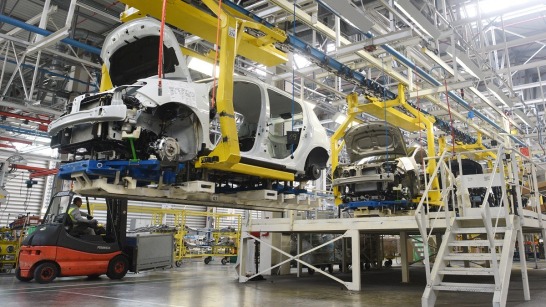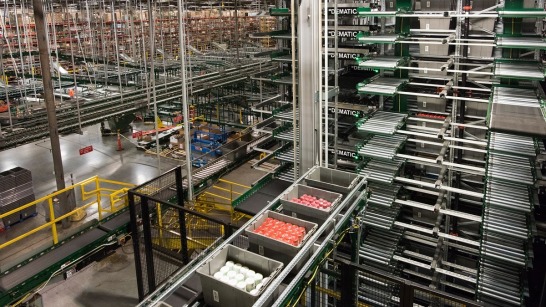“Somewhere between 200 and 300 tonnes of material enter and exit our facility on a daily basis,” estimates Clemens Fath, a Supply Chain manager of Vauxhall’s Vienna site. However, the roughly 1.2 million parts each year do not leave as individual parts, but as engines or transmissions instead. Fath’s plant produces about 50 types of engines alone. “It all has to be planned with precision,” explains the 40-year-old. “The arrival of the individual parts, their correct distribution via conveyor belt, their interim storage and even careful planning in case of bottlenecks.” It is a logistical and intralogistical challenge that demands a fleet of 70 industrial trucks, including forklifts, tow tractors and tugger trains.
The spearhead of experimentation
Logistics has always been vital in the automotive industry, where finished products can cost several thousand euros. Thus, a watchful eye must be constantly kept on costs and prices as well as on ways to optimize or streamline processes or reduce production costs. “Our industry is about extreme competition and cost pressure,” reveals Fath. Particularly in Europe, where labor costs are higher than in other regions of the world. “If we want to compete with other continents, we either need to be faster or more innovative and we must absolutely stay one step ahead of the competitors all around us.”
From a provider's perspective such as KION Group's, it seems to be a paradox. “Many producers are focused on the cheapest prices and yet they want to be innovative,” says Lars Schürmann, the head of National Key Accounts at Linde Material Handling. “At first glance, it's as if we are talking about polar opposites, but, in fact, this is what often spurs experimentation with new technologies and ideas.” Since the major producers and suppliers are also corporations, they can afford to make capital expenditures that will pay off in the long term.
Not the most popular process
For many producers, logistics is an unavoidable and not very well liked process. “It does not always add value,” professes Schürmann. Or, as Fath put it, “If a tow tractor operator drives even a single kilometer, it's actually viewed as wasted time. They cannot do anything other than sit.”
No wonder, then, that the largest automotive companies employ entire armies of employees who are responsible for optimizing logistics processes. And one area where both logistics experts and supply chain managers have become particularly curious is automation. “Productivity, operational safety and the knowledge that we are not left behind by this trend,” admits Fath, listing three reasons why he is bringing automation to logistics. Here as well you will find the familiar combination of cost pressures and willingness to innovate. Starting in June, the Vauxhall plant in Vienna will be equipped with autonomously operated tugger trains, moving from the goods warehouse to production or assembly.
“We know that our competitors in Japan are already investing heavily in automation in material provision,” states Fath, who keeps an eye on developments. The bottom line is always whether an innovation is actually financially viable. “There are plenty of attractive innovations and new technologies on the market, but do they actually pay off?”
Networked data as an attractive option
That said, how tugger trains are coordinated with one another is something that interests Fath: networked data. “If we can combine the various systems, or if there was a warehouse system that could tell me where I could find any part at any time...” Fath trails off, leaving the rest of his thought to the imagination. The conclusion is already clear: anyone looking to optimize and who needs as much information as possible would see networked data as an attractive option down the road.
“In principle, every company in the automotive industry is confronted with the same questions,” states Schürmann, not least because the sector is facing various potential disruptions: trends such as electric mobility or automated driving threaten existing business models, requiring multi-pronged planning yet without any forecast in terms of when the trends will become commercially successful. It demands absolute flexibility. “Automation is a factor that can cut costs while ensuring that employee skill sets do not necessarily go to waste,” Schürmann explains. “Many companies find themselves in a constant desperate searching for good plant employees and they don’t want them to operate tow tractors.” The question begging to be answered is whether everything can still be transported to exactly the right place according to plan in the future.
Efficiency and versatility
Speed itself is practically immaterial. Fath says that ‘just in time’ does not necessarily mean breakneck pace, but rather exactly at the right time. Speed is a factor in planning but less so in delivery. Efficiency and versatility drive the industry and speed is gradually becoming less important. “Delivery times for cars are already extremely short,” says Fath. “Customers can have their vehicle in a matter of a few weeks.” Discussions around same-day delivery, which currently dominate other industries, give him little worry. At least for now.“Until drones can deliver a car, but we are still some way away from that.”



